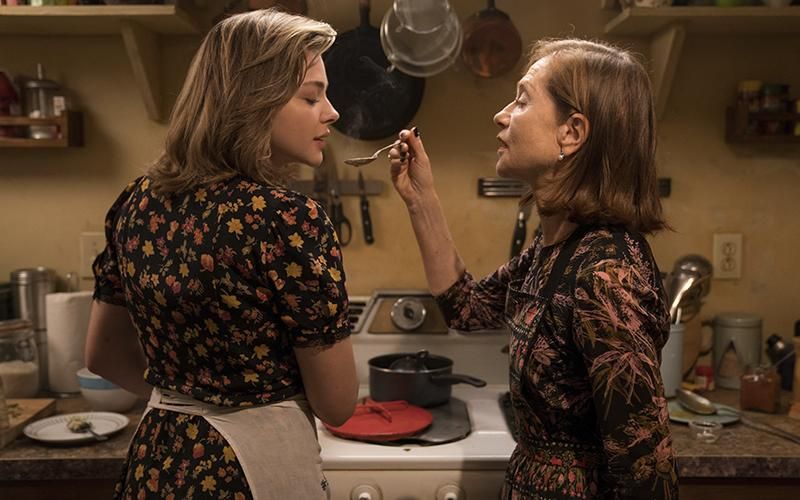Isabelle Huppert and Chloë Grace Moretz play a dangerous game of cat and mouse in Greta, a campy thriller with a pair of memorable performances that is critically compromised by a cliche-ridden screenplay.
Cut from the same cloth as ’90s stalker movies like Single White Female and The Hand That Rocks The Cradle, the film cycles through conventions of the sub-genre with relative ease but does so without making much of an impression on its own terms. Irish director Neil Jordan, probably still best known for his Oscar-winning The Crying Game, is able to generate some suspenseful scenes in the third act, even if it takes a little too long to get there.
Moretz stars as Frances, a young waitress living in New York with her street-smart friend Erica (Maika Monroe), who finds a deserted purse on the subway one evening after her shift. Wanting to do the right thing, she follows the address on the driver’s license inside and subsequently meets the titular character played by Huppert, a widowed piano teacher who seems plagued by loneliness.
The two soon become close, but after Frances finds evidence that suggests their initial meeting might not have been as serendipitous as it seemed, Greta becomes obsessed with preserving what she views as their mother-daughter relationship.
It’s vital for a movie like this to have a central character with whom we can empathize as she goes through an increasingly alarming scenario. Thankfully, Greta undoubtedly excels in this area. Moretz does a fine job at imbuing Frances with grace and likability right off the bat, while Monroe also continues a nice string of work as a more cynical and savvy counterpart to the naive Frances. But as you may expect, it’s Huppert as the unassuming but deranged Greta who steals the show as she tiptoes and terrorizes her way through a story that isn’t quite deserving of her abundant talents.
The script, co-written by Jordan with Ray Wright, does not feel as fresh as it should for a film of this genre and creates moments that inspire dubious questions in the minds of audience members. For example, if one was alerted to being watched in a crowded public area, why would he or she leave that area to walk alone down a dark alley? Also, if a kidnapper restrained her captive in a bed, why would she place the bed post up against a wall so that visitors could hear the commotion from said bed post? It’s a shame that the plot folds under basic scrutiny from common sense questions like these because a little fine tuning could have eliminated these errors.
Aside from the reckless plotting and glaring issues with many of the decisions made by the characters, there are small delights from a technical aspect that piqued my interest at various points. I appreciated the way Javier Navarrete interpolated the familiar tune of Lizst’s “Liebestraum,” which is played by Greta during her first meeting with Frances, into his tense musical score. Jordan also captures a side of New York that feels more isolated and lonesome than the bustling metropolis we typically see on-screen.
Unfortunately, touches like these are simply grace notes to a melody that feels all too familiar and make Greta a fluffy and forgettable thriller.
Coming to theaters this weekend
Captain Marvel, starring Brie Larson and Samuel L. Jackson, is the latest Marvel movie, this one about an Air Force pilot who gets caught in intergalactic conflict between two alien worlds.
Arctic, starring Mads Mikkelsen, tells the harrowing story of a man stranded after an airplane crash who must decide whether to remain in his makeshift camp or to embark on a deadly trek through the unknown.
Opening at Cinema Center is Song of Back and Neck, starring The Office’s Paul Lieberstein and Rosemarie DeWitt, in which a man with chronic muscle pain begins to find relief when new romance enters his life.
 Submit Your Event
Submit Your Event



